

 |
 |
||||
| Home | Reviews | Extras | Forums |
|
GeGeGe no Kitaro (2018) - Episode 50-97SynopsisWith Nanaki defeated, Kitaro now faces the problem of having to hunt down and return four particularly dangerous yokai known as "the Four Generals" who escaped from the underworld. This is the favor Lord Enma demanded for the return of Neko Musume, and there's a rather strict time limit to it as well; where failure to deliver means both Neko Musume and Kitaro would have to return and spend the remainder of their lives there. And even beyond that, humanity and yokaidom will both have to deal with the machinations of Nurarihyon, who is more than willing to stoke the fires of prejudice among both yokai and humans to get what he wants, and will sacrifice anyone to make it happen. ReviewIf there is one particular thing I noticed about GeGeGe no Kitaro when I watched the first half of it, then that would be that it's quite unapologetic about how it plays out, and that terrible decision making isn't necessarily a sign that someone is evil any more than being evil isn't a question of being either human or yokai; it's a decision or a course of action every being with a certain level of consciousness can undertake. 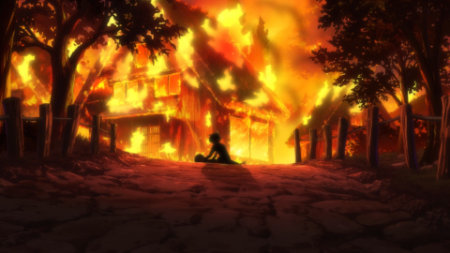 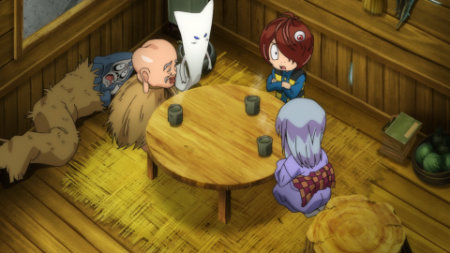 Things are, of course, understandably tense right after the events centered around Nanaki. Though in the end, he turned out to be nothing but an infant spirit needing a good hug to cancel out the destruction and deaths he had caused through his long life of knowing nothing of hatred, both me and Tim were still kind of torn about how we felt about it. It's not a theme that's completely lost on GeGeGe no Kitaro either; sure, it's sad that horrible things have happened to someone, but that doesn't necessarily excuse the things they'd end up doing after the fact. It's a fine line to thread, but it's nice to see a show strike a good balance on what is sympathetic and what isn't. Furthermore, GeGeGe no Kitaro understands anger very well. Anger tends to be the driving force of most of the worst of bad decisions anyone makes, which definitely comes into play in the Four Generals arc. But especially in the Nurarihyon arc.... albeit in a different way; Nurarihyon himself wields the anger of both human and yokai like a weapon, putting them against each other. This is why he's so dangerous, even compared to the others, and why this arc might make people uncomfortable seeing as how a lot of politics are driven by this force at the time of writing. (Though not as methodically vicious and unapologetically as Nurarihyon is approaching his goal.) This seriousness is definitely what drives most of the darker episodes of GeGeGe no Kitaro, and this last half describes how hard it can be for people outside of a certain group to break into it, be that the creation of manga or just someone looking for a job, if you're not already a part of said group. The one about the yokai who just want to find a job to support his home village is particularly tough to stomach, because it shows -- in no apologetic tone -- how foreigners are often abused for labor, and I can't even say that is not a problem in my own country, sad as that makes me. As the episode in the first half with the comedian down on his luck showed us, we're not always guaranteed a happy ending, and even one that may be considered happy might come with some cost. It's a bit odd, then, that this last half of GeGeGe no Kitaro also introduces us to more random filler, many of which are just weird. You might have picked up on the fact that the things Kitaro wear have special abilities, but I'm sure not many people knew beforehand that his vest can actually act -- and fight -- individually, even when Kitaro himself is rendered unconscious. There were at least three episodes where Tim and I just ended up looking at each other in confusion (as much as we can look at each other over an entire ocean) and wondered what the hell we just watched. Looking back at it, I can't even tell whether I found said episodes detrimental to the show or not, but in hindsight, maybe I can forgive the show a few lapses of... sanity? ...since it's otherwise so consistently good. And yes, this show has come to an end by now. I'm not entirely sure whether I would have waited with the first review if I knew it was going to complete its run shortly after, but maybe doing it this way can make it easier for me to give longer shows a go. The downside of course being that unless significant changes happen throughout the show, it's going to be hard to find something new to talk about unless it has definite arcs like this show does. Either way, the conclusion is satisfying enough, even if it was a bit vague for my liking, though going into why would be more than a bit spoilerish. While Kitaro is still surpremely being himself, you can tell his friendship with Mana has changed him in small ways, and that becomes even more important during the more serious episodes where she's featured. One thing that did surprise me was his odd vulnerability about being taken off guard by the many yokai he encounters, but there are so many odd ways a yokai can alter you or immobilize you, I don't necessarily blame him for not knowing everything. Another thing that had me wondering for a while was that, upon reading the Kitaro wiki for research, I found out that in at least one of the incarnations of GeGeGe no Kitaro, Kitaro eventually got himself a wife who wasn't Neko Musume. Granted, in all the other incarnations of GeGeGe no Kitaro, Neko Musume herself was basically a child, and crushes or not, I imagine even yokai are a bit reticent in accepting children as their brides right off the bat. However, since the 2018 show clearly has a teenager Neko Musume, him accepting her as a girlfriend would've been much easier to accept, in addition to the aggravation over how he's so oblivious about it. Indeed, her feelings on the subject does become the topic of an episode, albeit another bit of an odd one, and whether he accepts those feelings before the show ends... well, I would not dream of spoiling that, of course. 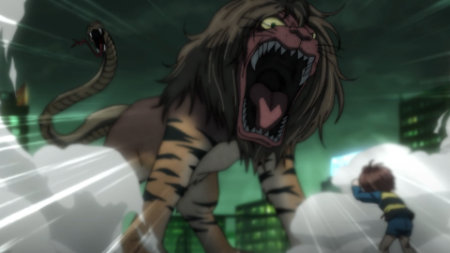 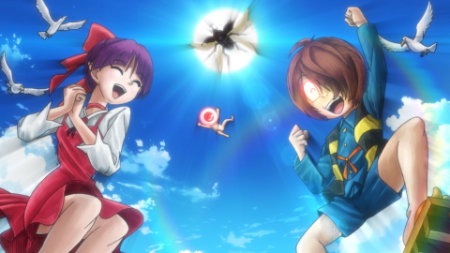 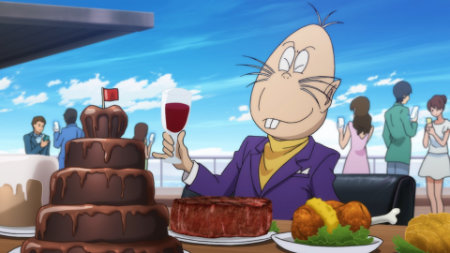 And if you're wondering about Rat Man, well... he's still being very much himself; always looking for a quick buck and not being all that concerned with who he screws over in the process. By and large, he becomes the poster child for how people turn out when they're only thinking about themselves, which is why it's so odd when he suddenly doesn't. This batch of episodes, however, give us some hints as to his longievity, as he's experienced at least one huge war, which has left him with a severe distaste of them and also makes him prone to go quite ballistic when it looks like one's going to start up. Humorwise, he also becomes the show's almost sole source of jokes that center around peeing or farting. I don't really remember if this was something he did a lot for the first half, but aside from being a sign of his attitude or general health, he also uses this as a non-lethal weapon in his arsenal. Which is a sentence that should be even more amusing for our British readers. Like most long-running shows, you can tell the animation house chafed at keeping the animation quality up to scratch, but they didn't always succeed. Humorously enough, you can almost notice how high on the priority order each episode has by how well it looks, with the more offbeat ones running a bit off model or looking all slidey in motion. That being said, the show does look pretty good in general, and at least the bigger, more bombastic episodes look great, so it's not like I'm trying to compare this to some of the other shows I've watched with truly atrocious animation. I guess it is kind of telling that we tend to notice differences in animation quality in the same show more clearly than between different shows. Speaking of chafing: as charming as the opening theme is, I have to admit I was getting a bit tired of it by the end after 97 episodes of Rat Man reminding us that they didn't have school or ever got sick, and this is a song that is traditionally bound to this franchise through all its incarnations, slightly modernized each time. There is a large variety of ending themes to mix things up, though, and while the opening song is the same, the animation in it featured a rather interesting change while still being more or less the same as well. But yes, the song happens in nearly every single episode of this show, and while I've never actually watched any of the older GeGeGe no Kitaro shows, I did watch a montage of the various versions of the opening theme. While there are some mild differences to each of the songs apropos of their times of release, it's still basically the same song, so if I can get this tired of what basically amounts to a fun song by the end of episode 97, I don't even want to imagine how a dedicated fan of the whole franchise would feel about it. Or maybe they'll be fine with it. You never know. 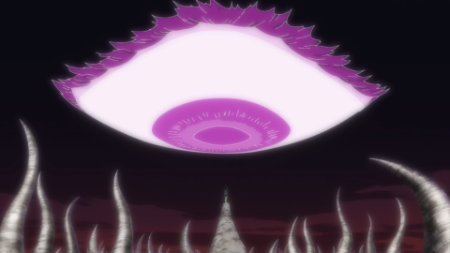 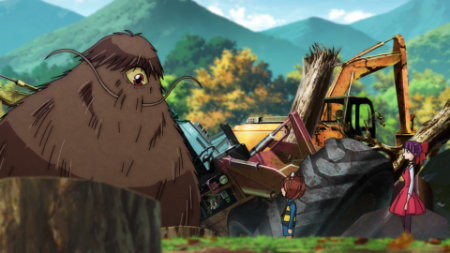 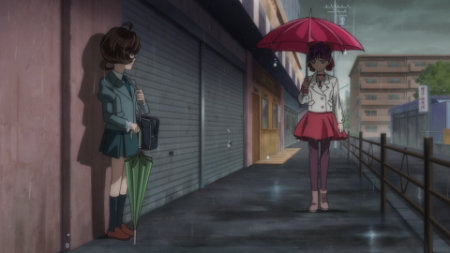 In the end -- and this really is the end of the newest incarnation of the Kitaro franchise, at least for now -- I had a really good time with GeGeGe no Kitaro, even when it was making me the most uncomfortable. It's an old franchise given so many new fresh coat of paints, and the recent one does, as I mentioned in the review for the first 49 episodes, strike a nice balance between tradition, modernisation and culture in general. Kitaro is a flawed but sympathetic lead that spearheads a large variety of interesting yokai personalities for both good and bad, and through Mana, he slowly gains an appreciation for the possibility of gaining human allies as well as yokai ones. And with the four generals first trying to shake things up, and then Nurarihyon showing up to ruin everything for his own purpose, that means you won't get bored with these remaining 48 episodes either. They don't really make these like they used to, except apparently they do. — Stig Høgset Recommended Audience: Much like the first half, the main concerns you should have about this is the sometimes very dark representations of human and yokai nature. People sometimes die, yokai die and Rat Man, for his questionable moral stance, is clearly suffering from PTSD centered around a war he had to endure. Version(s) Viewed: Digital stream on Crunchyroll, Japanese with English subs. Review Status: Full (48/48) GeGeGe no Kitaro (2018) - Episode 50-97 © 2018 Toei Animation. |
 |
|
| © 1996-2015 THEM Anime Reviews. All rights reserved. |